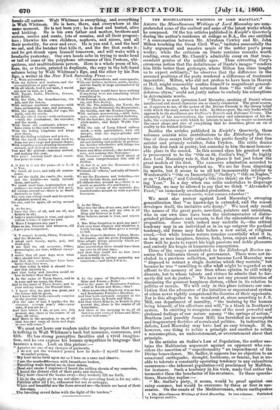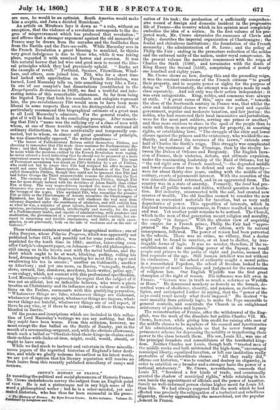THE MISCELLANEOUS WRITINGS OF LORD MACAULA.Y. * AMONG the Miscellaneous Writings
of Lord Macaulay are com- prehended some of the earliest and some of the latest works which he composed. Of the ten articles published in Knight's Quarterly during the author's residence at college as B.A., the one entitled " A conversation between Mr. Abraham Cowley and Mr. John Milton touching the Great Civil War," imitates successfully the lofty argument and massive music of the nobler poet's prose works ; while the criticism on Dante contains remarks worth reading, even after Mr. Church's admirable essay on that tran.- seendant genius of the middle ages. Thus correcting Cary's erroneous notion that the definiteness of Dante's images renders him little better than grotesque, where Milton has since taught us to expect sublimity," he observes that the difference in the assumed positions of the poets rendered a difference of treatment imperative. Milton, who did not profess to have been in Heaven or Hell, might reasonably confine himself to magnificent general- ities ; but Dante, who had returned from " the valley of the dolorous abyss," " could not justly refuse to embody his conceptions in determinate words.
"There is no poet (premises Lord Macaulay, speaking of Dante) whose intellectual and moral character are so closely connected. The great source, as it appears to me, of the power of the Divine Comedy is the strong belief with which the story seems to be told. In this respect, the only books which approach to its excellence are Gulliver's Travels and Robinson Crusoe. The solemnity of his asseverations, the consistency and minuteness of his de- tails, the earnestness with which he labours to make the reader understand the exact shape and size of everything that he describes, gives an air of reality to his wildest fictions."
Besides the articles published in Knight's Quarterly, these volumes contain nine contributions to the Edinburgh Review. One of these essays fairly estimates the poetic faculty of that fine satirist and princely versifier, John Dryden. His critic denies him the first rank in poetry, but concedes to him the most honour- able place in the second. In this second class his greatest work is pronounced to be the "Ode on St. Cecilia's Day." So highly does Lord. Macaulay rate it, that he places it but just below the great models of the first. The excessive admiration accorded to this poem has always surprised us. We are far from disputing its merits, but it seems to us all but immeasurably inferior to Wordsworth's " Ode on Immortality," Shelley's " Ode on Naples," or on " Liberty," and Coleridge's Ode (we think) on the " Depart- ing Year." In a day when one critic undertakes to disparage Fielding, we may be allowed to say that we think " Alexander's Feast," an immensely overlauded production, or else
" Dat vematu corvis, vexat censura columbas!"
We must also protest against Lord Macaulay's sweeping generalization that " as knowledge is extended, and the reason developes itself, the imitative arts decay." We need only recall the names of the great poets, novelists, painters and musicians, who in our own time have been the contemporaries of distin- guished philosophers and savants, to feel the untenableness of the proposition. Some truth indeed may underlie it,—the critical tendency may in an individual or in an age outgrow the poetical tendency, old forms may fade before a new social, or religious creed,—but while human nature remains essentially what it is, as long as man imagines, fancies, feels, loves, enjoys and suffers, there will be poets to report his high passions and noble pleasures and embody his tragic or humourous conceptions.
Three of the essays contributed to the Edinburgh Review ex- amine the Utilitarian theory of government. These were not in- cluded in a previous collection, not because Lord Macaulay was " disposed to retract a single doctrine which they contain' ' but because he was "unwilling to offer Quit might be regarded as an affront to the memory of one from whose opinion he still widely dissents, but to whose talents and virtues he admits that he for- merly did not do justice." We have not any present intention of discussing the greatest happiness dictum, either in its relation to politics or morals. We will only in this place intimate our con- viction that the advocates of the intuitive or supernatural system of ethics never rightly comprehend the theories of their opponents. Nor is this altogether to be wondered at, since according to J. S. Mill, one department of morality, "the training by the human being himself, of his affections and will," is a blank in Bentham's system. In omitting to recognize some of the most powerful and profound feelings of our nature among " the springs of action," Bentham (and possibly James Mill) has furnished an incomplete and fragmentary doctrine of morals and politics. In indicating its defects, Lord Macaulay may have had an easy triumph. It is, however, one thing to refute a principle and another to refute a misconception, an understatement, or overstatement about that principle.
In the articles on Sadler's Law of Population, the author sus- tains the Malthusian argument against an opponent who con- siders the assertion of " superfecundity " an impeachment of the Divine benevolence. Mr. Sadler, it appears has no objection to an occasional earthquake, drought, hurricane, or famine, but is un- able to tolerate a constantly operating tendency to any calamitous occurrence—the inherent population-evil proclaimed by Malthus, for instance. each a tendency in his view, made God rather the tormentor than the benefactor of his creatures. To these specula- tions, Macaulay replies :- " Mr. Sadler's piety, it seems, would be proof against one rainy summer, but would be overcome by three or four in suc- cession. On the-coasts of the Mediterranean, where earthquakes
• The Miscellaneous Writings of Lord Macaulay. In two volumes. Published by Longman and Co. are rare, be would be an optimist. South America would make him a sceptic, and Java a decided Manichean."
An article on Mirabeau lays it down as " a rule, without an exception, that the violence of a revolution corresponds to the de- gree of misgovernment which has produced that revolution ; " and affirms that a stronger argument against the old monarchy of France may be drawn from the noyades and the fusillades than
from the Bastile and the Pare-au-cerfs. While Macaulay sees in the French Revolution a great blessing to mankind, he thinks very great indulgence is due to those who, while it was taking place, regarded it with unmixed horror and aversion. It was this natural horror that led wise and good men to recant the libe- ral principles which they had previously upheld. " Burke set the example of revolt." Portland, Spencer, Fitzwilliam, Wind- ham, and others, soon joined him. Pitt, who for a short time bad looked with approbation on the French Revolution, was turned, Lord Macaulay tells us, into something very like a Tory. In one :of our essayist's last dissertations (contributed to the Encyclopedia Britannica in 1859), we find a truthful and inte- resting notice of this remarkable statesman. So far from being the bigoted. Tory that both his assailants and eulogists represent him, the pre-revolutionary Pitt would seem to have been more liberal in some respects than even his distinguished rival. .We particularly recommend this biographical estimate of a great man to all Lord Macaulay's admirers. For the general reader, the gist of it will be found in the concluding passage. After remark- ing that Pitt's "name was the rallying cry of a class of men with whom, at one of those terrible conjunctures which confound all ordinary distinctions, he was accidentally and temporarily con- nected, but to whom, on almost all great questions of principle, he was diametrically opposed," the writer continues :— " The haters of Parliamentary Reform called themselves Pittites, not choosing to remember that Pitt made three motions. for Parliamentary Re- form ; and that though he thought that such a reform could not safely be made while the passions excited by the French Revolution were raging, he never uttered a word indicating that he should not be prepared at a more convenient season to bring the question forward a fourth time. The toast of Protestant ascendancy was drunk on Pitt's birthday by a set of Pittites, who could not but be aware that Pitt had resigned his office because he could not carry Catholic Emancipation. The defenders of the Test Act called themselves Pittites, though they could not be ignorant that Pitt had laid before George the Third unanswerable reasons for abolishing the Test Act. The enemies of Free Trade called themselves Pittites, though Pitt was far more deeply imbued with the doctrines of Adam Smith than either Fox or Grey. The very negro-drivers invoked the name of Pitt, whose eloquence was never more conspicuously displayed than when he spoke of the wrongs of the negro. This mythical Pitt, who resembles the genuine Pitt as little as the Charlemagne of Ariosto resembles the Charlemagne of Eginhard, has had his day. History will vindicate the real man from calumny disguised under the semblance of adulation and will exhibit him
i
as what he was, a minister of great talents, honest intentions, and liberal opinions, preeminently qualified, intellectually and morally, for the part of a Parliamentary leader, and atpable of administering, with prudence and moderation, the government of a prosperous and tranquil country, but un- equal to surprising and terrible emergencies, and liable, in such emer- gencies, to err grievously, both on the side of weakness and on the side of violence."
These volumes contain several other biographical notices ; one of
John Bunyan, whose Pilgrim Progress,' which was apparently not published before 1671, and possibly not for some years after, was reprinted for the tenth time in 1685 ; another, interesting even after Carlyle's eloquent paper, on Johnson—" the old philosopher— still among us in the brown coat with the metal buttons, and the shirt which ought to be at wash, blinking, puffing, rolling his head, drumming with his fingers, tearing his meat like a tiger and swallowing his tea in oceans ; " another on Goldsmith ; another on Atterbury ; and vet one more, on Bathe "renegade, traitor, slave, coward, liar, slanderer, murderer, hack-writer, police spy," —an eulogy, which, not content with this professional specification, Lord Macaulay—while expressing his regret that the subject of it was not an atheist, but an inflexible believer, who wrote a pious treatise on Christianity and its influence and a volume of medita- tions on the Psalms, surmounts with this gratifying peroration, " Whatsoever things are false, whatsoever things are dishonest, whatsoever things are unjust, whatsoever things are impure, what- soever. things are hateful, whatsoever things are of evil report, if there be any vice, or if there be any infamy, all these things wore blended in Bathe."
Of the poems and inscriptions which are included in this collec-
tion of Lord Macaulay's writings we can say nothing, but that they might have been worse. From this criticism, however, we must except the fine ballad on the Battle of Naseby, put in the mouth of a covenanting-sergeant, and, with the obvious allowances, much such a ballad as " Obadiah-bind-their-kings-in-chains-and- their-nobles-with-links-of-iron, might, could, would, should, or ought to have sung.
While we find much to instruct and entertain in these miscella-
neous papers of the regretted historian of England's later desti- nies, and while we gladly welcome his earliest as his latest words, we are yet of opinion that his literary reputation will receive no fresh lustre from this recently published miscellany of essays and reviews.



























 Previous page
Previous page